David Dubrow's Blog, page 12
August 1, 2018
Book Review: Night of the Furies
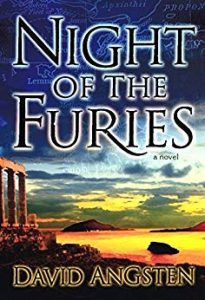 In Night of the Furies, David Angsten weaves history, mythology, and thrills into a novel that’s as difficult to put down as the first book in his Night-Sea Trilogy, Dark Gold, with an even harder edge. Night of the Furies takes us to Greece, where Jack Duran is once again lured by his semi-crazy brother Dan into a secret world of mysticism and peril: this time, they attempt to plumb the disturbing depths of the Eleusinian Mysteries, literary ground I haven’t traveled since reading Mary Renault’s The King Must Die decades ago.
In Night of the Furies, David Angsten weaves history, mythology, and thrills into a novel that’s as difficult to put down as the first book in his Night-Sea Trilogy, Dark Gold, with an even harder edge. Night of the Furies takes us to Greece, where Jack Duran is once again lured by his semi-crazy brother Dan into a secret world of mysticism and peril: this time, they attempt to plumb the disturbing depths of the Eleusinian Mysteries, literary ground I haven’t traveled since reading Mary Renault’s The King Must Die decades ago.
As it turns out, there’s as much danger inherent in the Bacchanal today as there was in the time of Theseus. And the Furies are real. Trust me.
While brothers Jack and Dan are as thick as thieves, one thing does come between them: the beautiful Phoebe, a Dutch foreign exchange student as alluring as she is untouchable. Her presence disturbs as much as the terrible truths Jack and Dan unearth.
In the last quarter of the novel everything crashes together into a shattering climax that will have you on the edge of your seat, gripping your e-reader with damp fingers. It’s that good. From heart-pumping chases across ancient rooftops to sensuous orgies to the horrific secrets behind the Eleusinian Mysteries, there’s something for everyone in Night of the Furies.







July 27, 2018
Bits and Pieces 7/27/2018
I’ve described some of my experiences in the hospital here, but there are a couple things that I didn’t mention at the time for brevity’s sake.
When you’re wearing a FALL RISK bracelet, the hospital staff is naturally concerned that you’re likely to fall down and injure yourself (more) if you try to walk. So they put an alarm on your bed that will go off if you get out of bed without a nurse or PCT there to help you. While standing and walking was agony, and using the trucker bomb was somewhat dehumanizing, having the bell put on my collar (so to speak) made the entire experience of micturation even worse. When they put the alarm on my bed and left I tested it to see what would happen. What happened was that four staff members rushed in as I stood there gritting my teeth in pain while the alarm on my bed blared loud enough to wake the Australian dead. So every time I had to piss, I’d call for a PCT who would come in to turn off the alarm. Then he or she would watch me hobble to the commode under the sink, drop my shorts under the hospital gown, and sit down. The PCT would then leave to give me a modicum of privacy. I had to piss a lot: the constant IVs guaranteed it. Pleasantly, they turned off the alarm during the final couple days of my stay so I had the freedom to urinate without permission, something I’d taken for granted since graduating secondary school. Don’t be a FALL RISK if you can avoid it.
The potassium tablets they made me take were awful. Everyone jokes about having to swallow horse pills, but the potassium tablets were something you’d give an elephant. I had to take two every day or so. Huge and uncoated, you had to break them in half to swallow them piece by piece. They went down like chunks of sandstone. I’d choke and gag every time, spraying water on myself. Once, after the PCT left, I choked so hard trying to swallow one that I accidentally spit it up into the little cup of water. It dissolved into sludge in seconds, so I threw back the sandy, grainy stuff like a man doing a shot of tequila. You need your potassium, you know. I imagine it could’ve been worse: I could’ve choked on a potassium tablet, stood up in my struggle to breathe, set off the FALL RISK alarm, vomited up potassium chunks, pissed all over myself, and collapsed for the nurses to find me in a puddle of my own urine on the floor. So I’m thankful that didn’t happen.
—
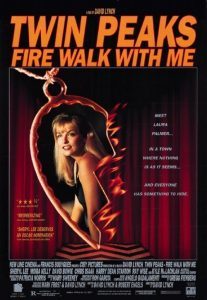 I recently watched Fire Walk with Me again in preparation for seeing Twin Peaks: The Return. I’d seen the film in the theater when it came out and wasn’t impressed. This second viewing has me surprised at its depth. (Younger me missed the nuances, I imagine.) Sheryl Lee’s portrayal of Laura Palmer is as wrenching a performance of a profoundly abused young woman as you’ll ever see. Overall, the movie’s horribly disturbing, and Lynch put a lot more care into it than you might think. It goes off the rails in some places, but even then you can’t help but be riveted. I never want to see it again. Too disquieting.
I recently watched Fire Walk with Me again in preparation for seeing Twin Peaks: The Return. I’d seen the film in the theater when it came out and wasn’t impressed. This second viewing has me surprised at its depth. (Younger me missed the nuances, I imagine.) Sheryl Lee’s portrayal of Laura Palmer is as wrenching a performance of a profoundly abused young woman as you’ll ever see. Overall, the movie’s horribly disturbing, and Lynch put a lot more care into it than you might think. It goes off the rails in some places, but even then you can’t help but be riveted. I never want to see it again. Too disquieting.
—
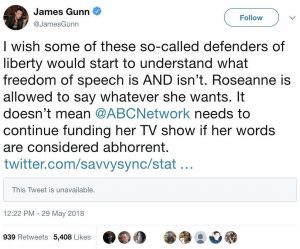
There are a number of issues surrounding James Gunn’s ouster from Disney that haven’t been addressed in the popular press, so I’ll outline them here.
Disney is in the business of entertaining children. It would be an extremely troubling business decision to employ a man given to making jokes about raping children, so they wisely canned him.
James Gunn didn’t just make a few little jokes about raping children. He made a lot of jokes about raping children. So many jokes that a normal person would conclude that this was an issue that took up a great deal of Gunn’s mental space. Whether he was a perpetrator, a victim, someone with pedophilic fantasies, or just a man with a horribly sick sense of humor wasn’t something that Disney, as his employer, needed to get to the bottom of. Best to let him work that out on his dime, not theirs.
Through frequent public pronouncements, Gunn made himself a political activist, railing against the current presidential administration. When you’re a political activist, you become a target for political activists on the other side of the aisle. It’s possible his collection of disgusting jokes would have remained under the radar if he hadn’t decided that about half his viewing audience were racists, bigots, or idiots because of who they voted for POTUS. But he did decide that, and he’s reaping the consequences of that decision.
James Gunn celebrated the firing of Roseanne Barr for making an unacceptable joke on Twitter. He made himself part of the outrage mob when it would have been easier to just keep his mouth shut. Does he really deserve pity after that? Now that he knows how it feels, he’s not likely to join another outrage mob again.
The American left has weaponized social media against anyone it disagrees with since the first Facebook profile was uploaded. That normal people are now doing this to the left should come as a surprise to no one. It’s ugly and divisive, but the alternative is to allow an unhinged, amoral mob to continue to use a tactic that works. It’s a delight to see the left, embodied in an intellectual lightweight like James Gunn, eat it the way normal people have had to for years. Like it or not, normal people are now looking for Hollywood scalps. These new rules sure do suck, don’t they? This isn’t going to end, either. The progressives should’ve considered that.







July 18, 2018
Movie Review: The Last Jedi
 Despite my abhorrence of gigantic show business franchises, I watched The Last Jedi on Netflix. I’d seen all the other Star Wars films, not counting the side-story movies, so I was interested to find out what happened.
Despite my abhorrence of gigantic show business franchises, I watched The Last Jedi on Netflix. I’d seen all the other Star Wars films, not counting the side-story movies, so I was interested to find out what happened.
This was a mistake.
Star Wars: The Last Jedi is awful. Objectively awful. It’s so awful that ten minutes into the film you realize that writer-director Rian Johnson made such an awful film because he wanted to make an awful film to alienate fans of the first trilogy. Johnson’s intent was to destroy the Star Wars universe as previously conceived because he hates it, and he succeeded beyond anyone’s most fevered nightmares. Not only does Johnson hate Star Wars, but he also hates masculinity, heroism, and traditional storytelling. The proof is in the movie.
—
Part One: Rian Johnson Hates Masculinity
Every one of the male characters in the movie was evil, stupid, foolish, or a combination of the three. Every one of the female characters was brave, strong, wise, and properly scornful of the worthless men infesting the galaxy. It’s a male feminist’s perspective of male-female qualities, and as we all know, there’s little on this Earth more deserving of contempt than a male feminist. Male feminists loathe the masculine virtues and eschew the responsibilities of being men. Here’s a brief rundown of Rian Johnson’s characters. Star Wars is his now, not yours. The characters don’t belong to you. Love them or adopt the mantle of misogynist.
Luke Skywalker: Homicidal RE: Ben Solo (hence evil) and retreats to a distant planet to eliminate the Jedi order, arguably the last objective force for good in the galaxy (also evil).
Kylo Ren: Childish, evil, destructive, stupid.
Finn: As useful as a chocolate teapot, foolish.
Poe: Foolish, impetuous, mutinous.
DJ: Evil.
Leia: Brave, strong, wise, slaps Poe because she can. Always has her jaw clenched, presumably because she has to deal with stupid men all the time.
Holdo: Brave, strong, wise, condescending, brilliant.
Rose Tico: Brave, strong, wise.
Rey: We’ll get to her later.
None of these characters were the least bit likable. No effort was made for us to care about them or what they did.
—
Part Two: Rian Johnson Hates Heroism
Every time a male character was about to engage in some sort of heroic activity, his plan was either quashed or interfered with, because the Star Wars universe isn’t about heroes. It’s about…um…I don’t know what it’s about anymore. I do know that Luke Skywalker, the hero of the Rebellion from the original trilogy, the man who blew up the first Death Star and saved Darth Vader’s soul, did nothing at all heroic in The Last Jedi. He ran away to be a disgusting hermit who drinks green milk from the tits of gigantic space walruses. He seeks to destroy the Jedi order, which used to be a hero factory, and erase his own legacy. Then he kills himself. That’s the Rian Johnson version of a hero.
Poe disarms the First Order’s most frightening ship, the dreadnought, but Leia slaps and demotes him because some people died in the fight. Even though it’s a war and people die in wars. His heroism is unwelcome in the Rebellion, you see.
Finn attempts an act of self-sacrifice that will give the Rebellion precious time to find a path to escape, but the brave, strong, and wise Rose Tico stops him at the last second, because these kinds of heroics are unwelcome in the Rebellion. She even tells him, “I saved you. That’s how we’ll win. Not fighting what we hate. Saving what we love.” So it’s a war fought by devotees of My Little Pony. That’s the Rebellion.
—
Part Three: Rian Johnson Hates Traditional Storytelling
The terrible plot holes, dialogue, and storytelling could only have been created by someone deliberately attempting to subvert audience expectations regarding the nature of a well-told story.
Space Bombers: There’s no gravity in space. Everybody knows that. And yet the Rebellion has spaceships that drop bombs onto other spaceships. In space.
Dreadnought: The First Order’s most frightening ship was rendered useless by one X-wing and a space bomber. That drops bombs. In space.
Leia’s Spacewalk: Who knew Leia could manipulate the Force so well that she can survive explosive decompression and the deadly environment of outer space? Why hasn’t she done this kind of thing before?
Holdo’s Hyperspace Trick: Why hasn’t every Rebel force used this tactic until now to wipe out First Order fleets? Why can’t the hyperspace-capable ships have a remote “turn into fleet-destroying missile” system in place so the captains don’t have to die? How do you not slam into a star, meteor, moon, or other ship if hyperspace is just a way of going very, very fast?
The Casino Planet: The Last Jedi was the longest movie in the franchise. It didn’t need to be. Nothing Rose or Finn did throughout the film had any effect on anything else that happened. They went to the casino planet, heaped scorn on all the rich white people, went back, and achieved absolutely nothing except for wasting several minutes of our time. They didn’t have anything else for Finn to do and they needed another box to check with Rose Tico, the charmless, dwarfish space mechanic. Plot padding this obvious has to be deliberate.
Finn’s Phasma Fight: An anticlimactic ordeal that lasted about a minute. Phasma is the new Boba Fett: cool outfit, no personality or interest to her character, had a stupid death. Or maybe she’s not dead. Who cares? There wasn’t enough build-up between Finn and Phasma in the previous movie to make this fight anything other than dumb.
Rey: She’s the ultimate Mary Sue. She can do anything and everything better than everyone else. Brave, strong, and wise, she spurns Kylo’s offer because there wasn’t anything in it for her: she can rule the galaxy herself, thank you. Her training, such as it was, consists of minimal strain and meager introspection; she’s already stronger in the Force than Luke himself. Especially in lifting rocks. Even her parentage is meaningless: like a god, she just is. No Hero’s Journey for her, no sacrifice, no self-discovery; she transcends all that. Yawn. Why should we care?
—
On top of hating everything else, Rian Johnson really hates the original Star Wars movies, and proves that by having Luke casually toss his old lightsaber away the first minute you see him. That’s Johnson giving the middle finger to you sad, neckbearded fans who wanted to see the old stuff. Luke’s pathetic, fade-away death puts the exclamation point on that. No mourning scene over Han Solo. Admiral Ackbar just dies off-screen. C-3PO and R2-D2 get throwaway lines.
So…so you liked the original Star Wars? Well, that’s done: we’re throwing that crap away and remaking it into our own image, where the Force is female, where wars are fought with love, and where the masculine virtues are squatted over and pissed upon. And if you don’t like that, you’re sexist. And probably racist. That’s what the new Star Wars is about. I hope you dig it, because there’s nothing else coming. Deal, manbabies.
Inevitably after a review like this, someone will say, “Well, I liked it.” Good for you. You were entertained.
I wasn’t. This was an awful movie, and everyone involved in it should be embarrassed to be part of such a piece of SJW trash. And if you liked it, maybe you should be embarrassed, too.







July 11, 2018
Civil War 2.0
In your favorite place for online opinion you’re bound to find a thinkpiece about Civil War 2.0: we’ve become so divided as a nation that the only logical next step is civil war. When a sitting Congresswoman, aided and abetted by an advocacy news media, tells American citizens to harass members of the current administration wherever they find them in public, there’s nowhere else to go but war. When a teenage kid wearing a Trump hat is physically attacked for it by a violent ex-con, and the violence is excused by media figures who refer to the kid as a Nazi, what’s next but armed conflict? When you can get financially ruined and personally destroyed for expressing basic truths like men and women having innate skill sets, or that a country has a right to determine who’s allowed to enter it and who isn’t, or that a man who merely puts on a dress isn’t a biological woman no matter how often he claims to be, where else do you go but war? Civil war is imminent, the Civil War 2.0 doomsayers tell us.
 The doomsayers are too late. Civil War 2.0 started decades ago, and the battlefield is our culture. What else is the Culture War but a struggle for the domination of one set of ideas over another? We are already in a state of civil war, and if you want the right side to win, you need to acknowledge that and behave accordingly. It’s only your right to live as a free person at stake.
The doomsayers are too late. Civil War 2.0 started decades ago, and the battlefield is our culture. What else is the Culture War but a struggle for the domination of one set of ideas over another? We are already in a state of civil war, and if you want the right side to win, you need to acknowledge that and behave accordingly. It’s only your right to live as a free person at stake.
Part of accepting that you’re in a war is determining who the enemy is. The enemy is not just anyone who disagrees with you, voted for the other candidate, or otherwise has a different ideological outlook. (Except for socialists and communists, who are immediate enemies.) Tolerance means accepting that other people have different opinions. It doesn’t mean that you have to take those opinions seriously, but you should make an attempt to understand that a political opponent isn’t necessarily an enemy. If you voted Clinton and I voted Trump, we can still be good friends. You can hate Trump like poison, and I don’t care. It’s okay if you like pineapple on pizza, think we should have more common sense gun laws, or believe in a woman’s right to choose to abort her baby. And it’s okay if I think you have disgusting tastes, are the kind of person who makes other men risk their lives to protect your family, and have extremely shaky morals. But we’re not enemies. Yet.
We become enemies when you call me a Nazi. Or a racist. Or a fascist. When you try to ruin my career over our difference of opinion. When you try to destroy my reputation because I think differently from you. When you deny me opportunity because of my sexuality, skin color, ethnicity, religion, gender, or political outlook. Even though I’m a straight white man. Not only that, but we become enemies when you provide cover for the people who do those things. We’re enemies because once you take that step, we no longer have anything in common. We don’t have shared ethics. We simply have opposing purposes: you want to destroy me and I don’t want to be destroyed. That’s a state of war.
The enemy includes advocacy journalists who operate under the false cover of objectivity, the majority of entertainment media figures, a number of educators, and probably some of your colleagues, relatives, and acquaintances. What you do with the enemy is fight them. You don’t hang out with them, enrich them, help them, or give them cover to attack you. Until this Civil War 2.0 becomes an actual shooting war, which is unlikely, the first way to fight them is to ghost them. You withdraw all contact.
It’s tough. I get it. But when J.J. Abrams calls everyone who didn’t like The Last Jedi sexists who are threatened by women, why are you giving this asshole your money? Don’t you have anything better to do with your cash and time? Why would you do business with a publisher that accepts manuscripts based on the ethnicity of the writers, not the quality of their writing? (Any publisher that advertises its preference for people of color, LGBTQIA to Z, etc. is telling you that if you don’t possess those qualities, your work isn’t welcome. That’s the essence of bigotry.) When someone tells you that you’re the enemy because of who you voted for, shouldn’t you take him seriously? That feeling you have that something’s wrong, that what the self-appointed elites call good is actually the opposite: you have to listen to that feeling. And, as difficult as it is, you have to act on it. You have to separate yourself from those people and what they do. Anything less is giving them tacit support, and they’ve had that for decades to our culture’s great cost. You need to decide what’s more important: Star Wars or your ethics. Unfortunately, you can’t have both. They’ve politicized everything. Made you the enemy. Your entertainment choices are now fodder for character assassination. Opt out.
It’s even harder on a more personal level. Are you still Facebook friends with the guy who posts Trump swastika memes? Why? He is calling you a Nazi. Once he’s dehumanized you to that point, there’s no more relationship to save. Your tolerance for that isn’t a virtue. That’s not just a difference of opinion.
It means you’ll be leaving that dinner party before the dessert course when the friend of a friend goes on about the “concentration camps” on our border with Mexico. Or you’re going to have to pull your kid out of the class (or even the school) with the teacher who insists on brooming “dead white males” from the curriculum in favor of “writers of color” with a “more authentic voice.” You can’t break bread with Social Justice Warriors, socialists, or communists. They’re the enemy and they’re already working to destroy you. Don’t help them by giving them your attention. Ghost them.
I don’t like this kind of voluntary segregation either, but the alternative, the status quo, is far worse.







July 6, 2018
Going Home Again: The Elric Series
Despite all the television I watched, I did manage to read some books over the last month or so. Well, that’s not quite true. I re-read a bunch of books. Sometimes you just want some comfort food, not the healthy stuff.
My love of reading began with fantasy novels: The Chronicles of Narnia. Unsurprisingly, I moved to The Lord of the Rings after that, but then things took a strange turn: I discovered a thick paperback book called The Swords Trilogy by Michael Moorcock. The cover had a barbarian-looking figure on the front with the tagline, It is the time of the conjunction of the Million Spheres, and all things are possible. I opened it to the first page and fell completely inside. I don’t know that I’ve actually come out again.
As a born completist, I devoured everything I could of Moorcock’s work, including the incomprehensible Jerry Cornelius novels and the less-exciting Bastable books. After my recent illness I decided to give Moorcock’s Eternal Champion novels another read, now that I’m no longer young and fancy myself some kind of a writer. In the Going Home Again posts I’ll start with the Elric series, move to Hawkmoon, and end with Corum. When I first read them decades ago, I’d done Corum first, then Elric, then Hawkmoon. I still own all of my Michael Moorcock paperbacks, despite two cross-country moves. Some of them are over 35 years old.
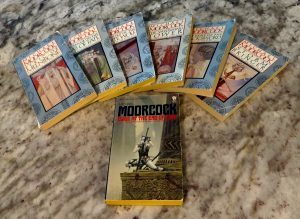 Reams have been written about how subversive and anti-establishment the Elric stories were when they first came out in the early 1960’s. Moorcock created the character as a kind of Conan in reverse: while Robert E. Howard’s Conan was a huge, muscled warrior who steals riches, kills sorcerers, and seeks to claim a kingdom for himself, Elric was a weak albino who uses drugs to stay alive, invokes horrifying sorceries, and throws away a kingdom. In many respects the Elric stories serve as a metaphor for drug addiction: Elric’s dreadful sword Stormbringer keeps him strong, but it eats the souls of whoever it cuts and eventually kills everyone he ever loved, including Elric himself. Heavy stuff.
Reams have been written about how subversive and anti-establishment the Elric stories were when they first came out in the early 1960’s. Moorcock created the character as a kind of Conan in reverse: while Robert E. Howard’s Conan was a huge, muscled warrior who steals riches, kills sorcerers, and seeks to claim a kingdom for himself, Elric was a weak albino who uses drugs to stay alive, invokes horrifying sorceries, and throws away a kingdom. In many respects the Elric stories serve as a metaphor for drug addiction: Elric’s dreadful sword Stormbringer keeps him strong, but it eats the souls of whoever it cuts and eventually kills everyone he ever loved, including Elric himself. Heavy stuff.
Book 1: Elric of Melnibone – This novel begins in dreamlike fashion, which is fitting because it takes place in a place called Imrryr, The Dreaming City. The first chapter is told in present tense, which adds to the ephemeral quality of the narrative. Elric, the emperor of the evil, decadent Melnibonean Empire, is the first ruler of his inhuman people to experience such things as conscience, which puts him at odds with both his subjects and, more importantly, his malevolent cousin Yyrkoon, who schemes to overthrow him and take Melnibone’s Ruby Throne for himself. It’s an exciting beginning to the series: Elric meets a sea deity of sorts; travels to a dark plane of existence where he meets the hero Rackhir, a former warrior-priest; and defeats his cousin with the help of the black sword Stormbringer. Then he does something completely incomprehensible: he abdicates his throne, sets the evil Yyrkoon on it as regent, and heads off to see the world, figuring he’d find himself and pick up his empire when he returns. The rest of the series could only move forward because Elric makes such a bizarre, foolish decision.
Book 2: The Sailor on the Seas of Fate – Probably the most fun book of the saga. Elric is marooned on a desert island and gets picked up by a ship sent specifically for him. On board the ship are other incarnations of the Eternal Champion: Corum, Erekose, and Hawkmoon, among many others. They go on a quest to repair the multiverse, so to speak, and Elric learns a bit about his destiny. From there, he meets Smiorgan Baldhead, a kind of pirate leader who becomes his friend, and with him, goes to acquire riches in the jungle. It’s got all the stuff you’d want in a fantasy novel, plus some trippy, bizarre bits you won’t find anywhere else.
Book 3: The Weird of the White Wolf – The first half of the saga comes to an end with this novel. Elric is now declared an enemy of Melnibone by his cousin Yyrkoon, who is naturally unsatisfied being merely a regent. So Elric goes to raid his former kingdom with a fleet of ships and rescue his lover Cymoril, Yyrkoon’s sister. Things don’t go as planned, despite Yyrkoon’s deserved end. Cymoril dies on the point of Stormbringer and Elric betrays everyone, including Smiorgan Baldhead. Melnibone is destroyed, her people scattered to the four winds. From there, he meets Moonglum, who becomes his friend throughout the remainder of the series, and clashes with the sorcerer Theleb K’aarna, who becomes a long-time enemy.
Book 4: The Vanishing Tower – Much of this book is taken up with Elric’s feud with Theleb K’aarna, who seeks to kill Elric out of spite and jealousy. Here, Elric’s always on the defensive. He travels to Tanelorn, a kind of holy city where weary heroes can find peace, only to learn that the city is in danger from Theleb’s horrible sorceries. Elric ends up meeting Corum and Erekose again in the Vanishing Tower, and saves Tanelorn, even though he knows he’ll never find the peace the city promises.
Book 5: The Bane of the Black Sword – This book’s a bit more scattered, but it sets things up for the end of the world. Elric has his final battle with Theleb K’aarna, reconciles with his Melnibonean people (who have taken up employment as mercenaries), and tries to settle down with his wife, a girl named Zarozinia. Then he must take up arms to save his new hometown, which will be overrun by a gigantic, terrible mercenary army led by an imprisoned sorcerer. We learn more about the forces of Chaos and how they plan to destroy the world. The best part of the book is the last story, which tells of Rackhir the Red Archer’s quest to save Tanelorn once again.
Book 6: Stormbringer – Here, everything comes to a close. Elric, who used to worship the Lords of Chaos, switches sides to fight on the side of Law. A new evil sorcerer rises as Elric’s opposite number: Jagreen Lern. It would’ve been better for Elric not to have killed Theleb K’aarna in the previous book so we could conclude the feud in this book; Theleb K’aarna and Jagreen Lern are pretty much the same person. Elric’s world is doomed. It can’t be saved. But if he defeats the forces of Chaos for the side of Law, the new world that will be created can be good and just. By the end of the book Elric has killed all of his friends and family, and is in turn slain by Stormbringer, who laughs and says, “Farewell, friend. I was a thousand times more evil than thou!”
I know there are a number of other Elric novels, and I’ve read some of them: The Fortress of the Pearl, The Revenge of the Rose, The Dreamthief’s Daughter, etc. But I couldn’t get into them. Once the hero dies in the story, it’s not as much fun to read his prequels and such, especially those written long after the original tales. I did enjoy Elric at the End of Time, though, and the Michael Whelan cover illustration is, as all of his work tends to be, awesome.
I don’t know if my son will ever become to avid reader that I was, but if he does, I’ll steer him toward the Elric saga when he’s ready. It’s fun, angst-ridden fantasy that broke all the rules and set the stage for the many hundreds of books from hundreds of authors that came after.







June 27, 2018
Television Show Reviews, Part Two
(Part One of this limited edition, hopefully once-in-a-lifetime series can be found here.)
Like any entertainment medium, television can be hit or miss, and even classic, beloved programs from days gone by may not hold up to today’s standards of production, acting, and narrative. On the other hand, there are a lot of mediocre-to-terrible TV shows out there, and more get churned out every day.
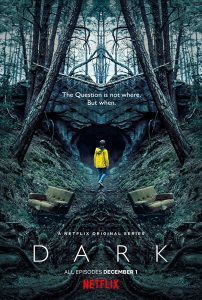 Dark is a German science fiction show that’s quite, well, dark. In it, a boy goes missing in the German town of Winden, and his disappearance near a series of caves on the town’s outskirts seems very similar to a child disappearance over twenty years prior. Winden is home to a gigantic nuclear power plant, as well as a series of characters that range from the troubled to the bizarre. Horribly burned bodies show up. Birds die. Mysteries are plumbed. And then things get very, very strange. It’s a slow moving program that keeps its cards very close to the vest, so close that most of the plot elements aren’t resolved by the final episode; in fact, even more mysteries are presented at the end. This is terribly unfair to the viewer, who after ten episodes of patient watching deserves at least some closure. Instead, the show demands that you watch the next season, whenever it’s produced, and perhaps the writers might tell you what exactly is going on. Or they might not. For that reason I don’t know that I can recommend this show, unless you have a lot of time to kill.
Dark is a German science fiction show that’s quite, well, dark. In it, a boy goes missing in the German town of Winden, and his disappearance near a series of caves on the town’s outskirts seems very similar to a child disappearance over twenty years prior. Winden is home to a gigantic nuclear power plant, as well as a series of characters that range from the troubled to the bizarre. Horribly burned bodies show up. Birds die. Mysteries are plumbed. And then things get very, very strange. It’s a slow moving program that keeps its cards very close to the vest, so close that most of the plot elements aren’t resolved by the final episode; in fact, even more mysteries are presented at the end. This is terribly unfair to the viewer, who after ten episodes of patient watching deserves at least some closure. Instead, the show demands that you watch the next season, whenever it’s produced, and perhaps the writers might tell you what exactly is going on. Or they might not. For that reason I don’t know that I can recommend this show, unless you have a lot of time to kill.
On the heels of Dark, and because I kind of enjoyed Harlan Coben’s Safe, I gave Coben’s other Netflix miniseries a try: The Five. This one also involves a missing child, and while the police, family, and friends deal with the aftermath twenty years later, it turns out that the missing kid’s DNA finds itself in a recent crime scene. There’s a good bit of family angst throughout, and it’s a little hard to appreciate all the characters, as some are much more likable and present than the others. There’s the bad boy who now runs a weird sort of dance hall/homeless shelter, the cop with a dad suffering from dementia, the missing kid’s older brother who still suffers guilt and shame, and the love interest whose subplot involving pill addiction went nowhere and kind of wasted everyone’s time. I did like the end, which wrapped things up poignantly and neatly, but overall it wasn’t as gripping or tragic as Safe. Skip unless you’re stuck in a hospital bed like I was.
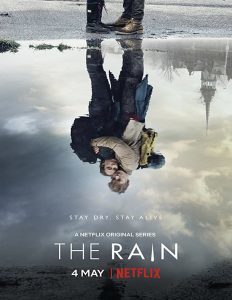 Are you into Danish TV? Who isn’t? Either way, you might want to try out the sci-fi dystopia show The Rain. It follows a familiar sort of disease-caused end of the world scenario with a twist: anyone caught in the rain dies of a horrible illness within a minute or two. The young son and daughter of the scientist who may or may not be responsible for the disease hole up in a fallout shelter-like underground facility until the food and air run out, and must venture to the surface to survive, find other fallout shelters, and look for their scientist dad. A grim sort of show, rather formulaic, with few surprises. None of the characters were terribly likable or relatable. It ends exactly the way you would expect, unfortunately. Think of it like The Walking Dead, except everyone’s a teenager and there aren’t any zombies. If you watch it you might like it. If you don’t you probably won’t regret missing it, even on your deathbed.
Are you into Danish TV? Who isn’t? Either way, you might want to try out the sci-fi dystopia show The Rain. It follows a familiar sort of disease-caused end of the world scenario with a twist: anyone caught in the rain dies of a horrible illness within a minute or two. The young son and daughter of the scientist who may or may not be responsible for the disease hole up in a fallout shelter-like underground facility until the food and air run out, and must venture to the surface to survive, find other fallout shelters, and look for their scientist dad. A grim sort of show, rather formulaic, with few surprises. None of the characters were terribly likable or relatable. It ends exactly the way you would expect, unfortunately. Think of it like The Walking Dead, except everyone’s a teenager and there aren’t any zombies. If you watch it you might like it. If you don’t you probably won’t regret missing it, even on your deathbed.
If I seem ambivalent about these three programs, it’s because I am. However, they did capture my attention during a somewhat difficult time, so I’ll always remember them. Until I forget all about them.







June 22, 2018
Hold On
 Three years ago, Liberty Island published my short story Hold On. I wrote it in response to the Obama administration’s policy of encouraging thousands upon thousands of citizens of Latin American countries to enter the United States as refugees.
Three years ago, Liberty Island published my short story Hold On. I wrote it in response to the Obama administration’s policy of encouraging thousands upon thousands of citizens of Latin American countries to enter the United States as refugees.
In the wake of the recent media outrage over illegal immigrant children being separated from their parents at the border, Hold On has become more relevant than ever. It’s about bureaucracy, family, upheaval, and yes, separation.
You can read it free of charge here.







June 20, 2018
Television Show Reviews, Part One
My recent illness found me incapable of doing anything but lying on the sofa (or a hospital bed) and suffering. It was worst in the early stages, when a non-stop headache made every waking moment a misery. I’m still not 100% now, and must spend part of the day reclining, but every day I thank God I’m not the me from a few weeks ago. That was awful.
So what do you do when you can’t do anything? You watch television, of course. In the last three weeks I’ve watched more television than I have in the last fifteen years. This is not a thing I’m proud of, but you do what you have to to get through. Pleasantly, there is more than enough TV available on Netflix to keep one occupied until Kingdom Come, more or less, so finding something to watch is never a problem.
What follows is a general rundown of the television shows I’ve binge-watched lately. Despite my illness, I watched them with a clear head and an eye for quality. There may be some minor spoilers here and there, but if you’re a grown-up, you can deal.
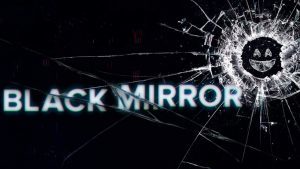 Black Mirror: Progressive millennials love this show. (I don’t look down on millennials like many Gen-Xers do; our military is filled to the brim with millennials and it’s the greatest fighting force on Earth.) It’s supposed to be a Twilight Zone-esque program focusing on technology running amok and its effects on society. Mostly science fiction with some horror and satire elements. Produced in the UK. Decent special effects, decent acting. It’s horrible. Unwatchable for anyone who isn’t stuck in a hospital bed. Imagine what scares your least-thoughtful progressive friend the most about something like social media, race relations, or surveillance cameras, and Black Mirror has made an episode about it. Every episode is predictable, tedious in its preachiness, and unbelievably dreary. This is what happens when the humorless, identity politics-obsessed social justice crowd makes TV for other humorless social justice warriors: a bland, pathetic, intelligence-insulting mess that gets by on intention over substance. Avoid at all costs. It’s possible that my recovery would be going faster if I hadn’t subjected myself to this waste of time.
Black Mirror: Progressive millennials love this show. (I don’t look down on millennials like many Gen-Xers do; our military is filled to the brim with millennials and it’s the greatest fighting force on Earth.) It’s supposed to be a Twilight Zone-esque program focusing on technology running amok and its effects on society. Mostly science fiction with some horror and satire elements. Produced in the UK. Decent special effects, decent acting. It’s horrible. Unwatchable for anyone who isn’t stuck in a hospital bed. Imagine what scares your least-thoughtful progressive friend the most about something like social media, race relations, or surveillance cameras, and Black Mirror has made an episode about it. Every episode is predictable, tedious in its preachiness, and unbelievably dreary. This is what happens when the humorless, identity politics-obsessed social justice crowd makes TV for other humorless social justice warriors: a bland, pathetic, intelligence-insulting mess that gets by on intention over substance. Avoid at all costs. It’s possible that my recovery would be going faster if I hadn’t subjected myself to this waste of time.
Safe: After Black Mirror I wanted to watch something with some complexity. Safe, a suburban mystery-thriller, looked interesting: a murdered teen, a dad looking for his daughter, family secrets, some law enforcement intrigue (who doesn’t love that). Not only that, but I’d be treated to Michael C. Hall of Dexter fame aping an English accent the whole show. So it was a shoe-in. Overall, I liked it. Oh, the plot only moved forward because the characters made some inexplicable decisions, and Hall’s English accent was entirely unnecessary, but it was decent. Keeps you watching if you don’t want to think too deeply. If nothing else, watch it for Nigel Lindsay’s portrayal of Jojo, a wealthy, buffoonish business owner: he’s hysterically funny and steals every scene he’s in. They wisely use him in small bits, but he makes the role invaluable.
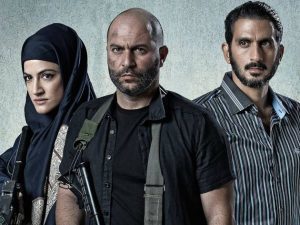 Fauda Season Two: You’ve seen season one, haven’t you? If not, you are in for a treat. It’s a show about the Israeli-Palestinian conflict that tells the story from both sides. The Palestinians are portrayed accurately: evil, amoral, and disgusting, but it’s fascinating to see them justify their atrocities and how they carry them out. The good guys, the Israelis, are depicted as being in the IDF’s Duvdevan Unit, a counter-terrorism force. (Several years ago I worked with Garrett Machine, a former Duvdevan Unit member, on an instructional video on Combat First Aid.) The show’s a fascinating look at the Middle East, at life in the Palestinian territories, and life in Israel. I highly recommend both seasons.
Fauda Season Two: You’ve seen season one, haven’t you? If not, you are in for a treat. It’s a show about the Israeli-Palestinian conflict that tells the story from both sides. The Palestinians are portrayed accurately: evil, amoral, and disgusting, but it’s fascinating to see them justify their atrocities and how they carry them out. The good guys, the Israelis, are depicted as being in the IDF’s Duvdevan Unit, a counter-terrorism force. (Several years ago I worked with Garrett Machine, a former Duvdevan Unit member, on an instructional video on Combat First Aid.) The show’s a fascinating look at the Middle East, at life in the Palestinian territories, and life in Israel. I highly recommend both seasons.
Altered Carbon: Sci-fi action. I couldn’t make it through the first episode. Nothing made sense, everyone behaved stupidly, and I didn’t care about anything that happened to anybody. James Purefoy couldn’t even save it.
More reviews in Part Two.







June 15, 2018
Where Have I Been Part Three
(Part one can be read here. Part two can be read here.)
Doctors don’t always agree on treatment, even in the rare event that they all have the same information at the same time. I had one internist, one infectious disease specialist, and one surgeon looking over my case. They were all kind. They were all busy. The information flows sluggishly through hospital filters, for reasons too arcane and manifold to list. So you have to ask a lot of questions. You have to remember what one doctor said and make sure your nurses and other doctors know what you know. But even then there’s miscommunication. It can’t be helped. As tired and awful as you feel, you have to be alert and sharp. If you’re lucky enough to have a loving advocate like a spouse, parent, or sibling, give that person all the information you get. People make mistakes. Even experts. It’s okay until it isn’t.
I went into the MRI machine for my leg. To cover the deafening noise of the machine, they piped pop music into my headset. I lay there and listened and tried not to move. The results of the MRI might determine if the surgeon would cut into my leg. Anxiety tightened everything to a high whine. The MRI field trip was a welcome break from the monotony of television shows watched on Netflix. I chatted with the intern who wheeled me to and from the MRI chamber. Despite everything, I made extra effort to be friendly and polite to everyone. Cracked jokes. I can do that with young women and not be creepy. Dad jokes. Most of the time I don’t know what to say to anyone.
 The surgeon looked at the results a day later and said that he didn’t think surgery was necessary. You can imagine my relief. The swelling had subsided some. Despite the pain, I was improving, bit by bit. Then the infectious disease doctor came by and hinted at potential surgery again. Then the internist said the same thing. Cutting into me was back on the menu. What I didn’t know then was that they hadn’t spoken to the surgeon, so they didn’t get the memo. A fear-filled day passed. Then they all talked to each other. The infectious disease doctor thought I should have surgery, but the surgeon didn’t, so they went with the surgeon. When the person whose job it is to wield scalpels doesn’t want to cut into you, it sends a powerful message.
The surgeon looked at the results a day later and said that he didn’t think surgery was necessary. You can imagine my relief. The swelling had subsided some. Despite the pain, I was improving, bit by bit. Then the infectious disease doctor came by and hinted at potential surgery again. Then the internist said the same thing. Cutting into me was back on the menu. What I didn’t know then was that they hadn’t spoken to the surgeon, so they didn’t get the memo. A fear-filled day passed. Then they all talked to each other. The infectious disease doctor thought I should have surgery, but the surgeon didn’t, so they went with the surgeon. When the person whose job it is to wield scalpels doesn’t want to cut into you, it sends a powerful message.
I felt good enough to eat a little more. I had no appetite, but I had to eat. I’d lost over twenty pounds. I’m not terribly unhappy about that, because they were pounds off my gut and face. That’s not a bad weight loss plan. To get food, your doctor assigns you a menu. For whatever reason I was assigned the Heart Healthy menu. You call the number on your menu and pick what you want for your meal. For breakfast every day I had fruit and a yogurt drink. You have to eat yogurt because the antibiotics kill the flora living in your gut and you don’t want to spend your hospital visit shitting brown water all day long into the miserable commode under the sink. I hated yogurt, so I got the yogurt drink. The drink wasn’t so bad. I also found that I don’t hate yogurt anymore. So I eat it every day now. For lunch I’d get a sandwich and the yogurt drink. For dinner, two yogurt drinks. I wasn’t hungry for anything else. Sometimes I’d get a small packet of Lorna Doone cookies that I’d eat if I wanted to celebrate something, like not having to go under the knife or being able to sleep more than 40 minutes at a time. You count your blessings.
Every morning around 3:00 someone would come in to take blood from me. A couple of times it was the same phlebotomist with an Eastern European accent, which tickled me to no end. At least she didn’t bite my neck. Eventually they got enough of my blood to narrow down the infection and give me more specific antibiotics. Now the question was: when would I leave? I’d been here for the best part of a week. One day they told me I’d be out by Friday. The next day they told me it might not be until Monday. I was reaching the end of my rope. I had to get out of there.
On Thursday they told me I was getting out the next day. I’d have to have a nurse come to my home a few days a week to change my bandages, but that was okay. That was…heaven. A final night, with more blood draws, blood pressure checks, stomach injections, and IV changes. My wife came by the next morning and waited with me. She’ll never know how much better she made me feel, just being there. I think they were probably sending me home because they’d done a bed count and had to close my ward anyway for lack of patients. Getting me out of their hair.
When I got home Friday I took a look at myself in the mirror and didn’t recognize the gaunt, hollow-eyed face staring back at me. He looked exhausted, with a head of thinning hair and a full beard. Who the hell was that? I’d shrunk. At least I was home. The worst part was over.
Later that day my wife went shopping and bought me a box of Lorna Doone cookies because I’d liked them in the hospital. I couldn’t help but laugh.







June 13, 2018
Where Have I Been Part Two
(Part one of this sad-but-true story can be read here.)
Despite (or because of) everyone’s best efforts, staying in the hospital overnight is not a fun experience. Multiply it by seven nights, and the experience goes from not-fun to very not-fun. Even in a private room like mine. Still, the bed is comfy, and you can adjust yourself to a sitting position with the handy-dandy remote control that also has the call button for the nurse and the television remote. Technology.
The first day of my stay, my IV port was stuck into my left hand. I’m left-handed. Oh well. On my right wrist, two bracelets: one declared me a FALL RISK and the other had bar codes that nurses and PCTs would scan before doing anything to me. A PCT is a Personal Care Technician, which I gathered is one level on the medical totem pole lower than a nurse. Nobody explained the distinction, so I had to guess from context. The worst a PCT can do to you is wake you up three times a night to stick a thermometer in your mouth, wrap a blood pressure cuff around your wrist, and jam your finger into a blood oxygen meter. The worst a nurse can do to you is inject you in the tummy every eight hours with something that prevents blood clots. If you’re lucky, they don’t come in the middle of the night to do this. I’m not lucky. My stomach is pocked with 2:00 AM injection sites.
A doctor came in to talk to me about what was happening, but he was going on vacation in a couple of days, so he’d pass my case to a different doctor. A surgeon came by to talk about things, but he was also going on vacation in a couple of days, so he’d pass my case to a different surgeon. Don’t get sick during vacation season. They also promised to have an infectious disease doctor come and take a look at me. The very term “infectious disease doctor” tends to make one nervous when you have to see one. As does the term “surgeon”. Nurses came and went to put up new bags of antibiotics in my IV. Everyone asked me how I got sick. I told them I didn’t know. I couldn’t point to a single event that precipitated my illness. So they gave me broad-spectrum antibiotics, and if my blood cultures came back with something specific, they’d give me something that was presumably less broad in spectrum.
 I tried to rest, but couldn’t sleep. My only entertainments were daytime television, nurses and PCTs coming in to jab/stick me, and peeing.
I tried to rest, but couldn’t sleep. My only entertainments were daytime television, nurses and PCTs coming in to jab/stick me, and peeing.
Peeing was awful. They give you a plastic jug to piss in. (They call it a urinal. Hee hee.) I’d get up (which was agony), lift my gown, put my wedding tackle into the jug, and go. Then I’d close the jug, hang the handle on the edge of the bed, sit down, clean my hands with sanitizer, and breathe until the pain of being on my bad leg subsided. All the while, my jug would hang nearby, filled with hot yellow brine. A couple of times it unhooked itself and fell on the floor. Luckily, it didn’t open. More than once I thought of trucker bombs. A trucker bomb is a plastic bottle that used to hold water. On long trips, truckers would piss in them, close them up, and chuck them out the window. That’s your trucker bomb. When the PCTs came in, or the nurses, they’d see my jug/trucker bomb and empty it into the commode under the sink in my room. After a couple of days of using the jug, I just shuffled to the commode instead. It hurt to lurch there, but it was less dehumanizing. Still, the empty-but-stained jug remained hooked to the bed near my head my entire stay. My own personal trucker bomb. Once I stopped using the jug they asked me how often I’d pissed that day. I tried to drink as little as possible because standing up to pee was so painful, but with IVs going right into your bloodstream you have to go anyway, whether you want to or not. I’m pleased to report that I didn’t have any accidents.
I asked my wife to bring me my laptop and e-reader. Those were lifesavers. As is my wife. Another day of live television and I’d have begged the doctors to put me into a medically-induced coma until death or recovery. My son didn’t like the hospital smells. I tried to reassure him that I’d be all right, but he was concerned. I hated that part. He’s a little boy. I want him to worry about the quality of dessert, not about his dad’s health. I put a positive spin on everything, even though I was concerned, too. He can see me sick, but he won’t see me scared.
Early on, we didn’t know how long I would be here. And then the possibility of surgery came up. An anesthesiologist came by the next day to ask me to sign a piece of paper consenting to general anesthesia.










